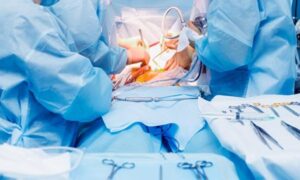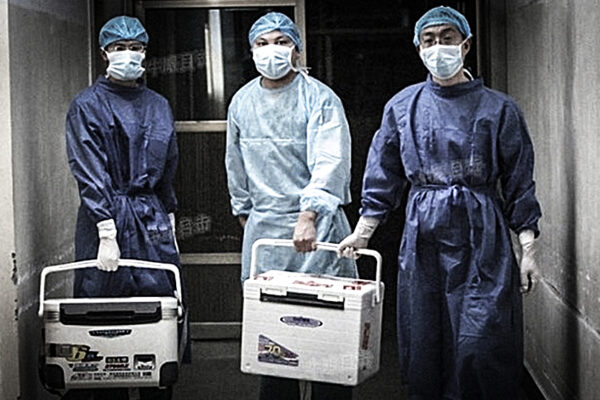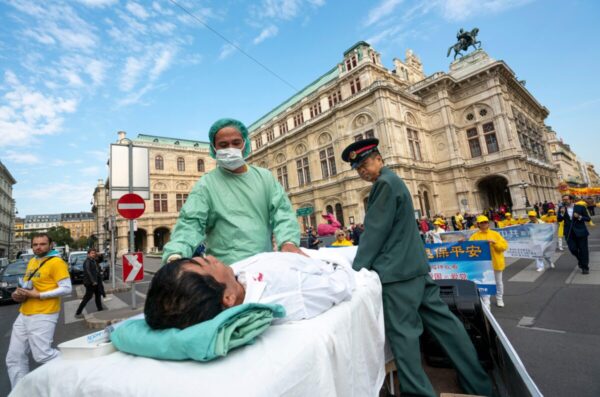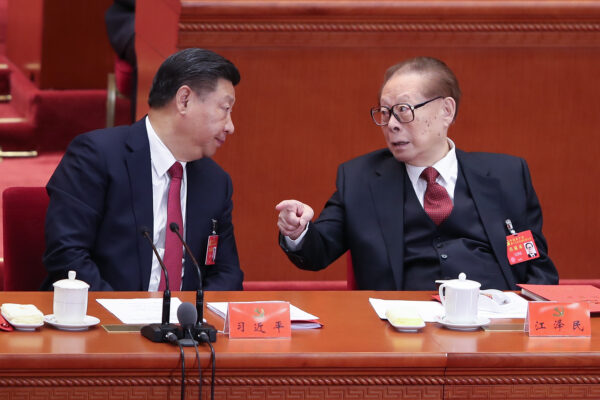China Loses a String of Military Doctors Linked to Forced Organ Harvesting
In the midst of China’s ongoing outbreak of COVID-19, at least 10 Chinese military physicians—many of them surgeons, and all Chinese Communist Party (CCP) members—have died. The list includes a notable surgeon who was suspected of involvement in forced organ harvesting. The deceased doctors join a large number of prominent party members who have died following the sudden reversal of China’s strict zero-COVID policies in December of last year. A Long List of Military Obituaries Publicly released obituaries show that at least 10 Chinese military doctors died between December of 2022 and January of 2023. On Jan. 27, Wu Zongyao, CCP member and professor of rehabilitative medicine at the First Affiliated Hospital of the Army Medical University, died at the age of 89. Wu was the recipient of many scientific and technological awards and honors. He was described in the obituary as an esteemed CCP member. On Jan. 25, Guo Shouyi, CCP member and professor of aerospace medicine at the Air Force Medical University, died at the age of 90. Guo was the deputy head of refractive medicine for the army’s ophthalmology committee. He had received many military and CCP awards and honors. On Jan. 16, Li Yuguang, CCP member and veteran Red Army soldier and military surgeon, died at the age of 101. Li was director of the army’s No. 211 Hospital and deputy director of logistics for the Heilongjiang Military Region. On Jan. 8, Ren Guilan, wife of CCP lieutenant general Liang Xingchu, died at the age of 93. Ren had served as a military surgeon and authored a book on military history. Doctors carrying organs for transplant surgery at a hospital in Henan Province on Aug. 16, 2012. (Screenshot/Sohu.com) On Dec. 27, Fu Jinhe, a military surgeon and CCP member, died at the age of 86. Fu served as a military surgeon and was deputy director of the Red Cross Taiwan Compatriot Hospital in Xiangshan County, Zhejiang Province. On Dec. 26, Zhang Yijun, CCP member and former deputy director of infectious disease at Guangzhou Air Force Hospital, died at the age of 86. Zhang also served as director of infectious disease at the army’s No. 458 Hospital. On Dec. 24, Hou Sili, CCP member and former party secretary at Zhejiang Medical University’s Hangzhou Branch, died at the age of 91. Hou served as a military surgeon at the Zhejiang Civil Police General Hospital, chief surgeon and deputy director of the Zhejiang Public Security General Hospital, and deputy director of the military’s No. 360 Hospital. On Dec. 24, Wang Chengqi, CCP member and former deputy director of the army’s No. 89 Hospital, died at the age of 91. He had served as a military surgeon, director of surgery and vice president of the hospital. On Dec. 6, Bai Tao, CCP member and former deputy chief physician at Guangzhou General Hospital, died at the age of 96. Bai was the deputy director of the hospital’s general surgery department. Falun Gong practitioners in Vienna, Austria, stage a mock demonstration of organ harvesting from prisoners in China during a protest against the importation of human organs from China to Austria, on Oct. 1, 2018. (Joe Klamar/AFP via Getty Images) Li Jieshou: Military Surgeon Involved in Forced Organ Harvesting On Jan. 30, 2023, Li Jieshou, CCP member and a member of the Chinese Academy of Engineering, former vice president of the Nanjing General Hospital, and a professor at Nanjing University, died after “ineffective medical treatment.” Li was 98. Li Jieshou and Nanjing General Hospital are on a list of Chinese doctors and facilities alleged to be involved in forced organ harvesting from Falun Gong practitioners. The list, released by the World Organization to Investigate the Persecution of Falun Gong (WOIPFG) in 2014, includes over 2000 medical personnel in military and police hospitals. Li came from a family of physicians: his brothers, both deceased, were also military surgeons. His younger brother, Li Leishi, was known as the originator of kidney transplants in China and was suspected of participating in a large number of forced organ harvesting operations. Li Leishi jumped to his death in 2010. CCP Military Heavily Involved in Forced Organ Harvesting It is worth noting that the Chinese military hospital system is deeply involved in the crime of forced organ harvesting. In October of 2022, the WOIPFG released an investigative report on the alleged involvement of the Chinese military and police hospital system in the live organ harvesting of Falun Gong practitioners. Chinese President Xi Jinping (L) talks with former president Jiang Zemin (R) during the closing of the 19th Communist Party Congress in Beijing, on Oct. 24, 2017. (Lintao Zhang/Getty Images) Perceiving the spiritual movement as a threat, former CCP leader Jiang Zemin ordered the extermination of Falun Gong practitioners in 1999. His directive: “bankrupt them financially, ruin their reputations, destroy them physically.” Since 2000, military hospitals in China have p

In the midst of China’s ongoing outbreak of COVID-19, at least 10 Chinese military physicians—many of them surgeons, and all Chinese Communist Party (CCP) members—have died. The list includes a notable surgeon who was suspected of involvement in forced organ harvesting.
The deceased doctors join a large number of prominent party members who have died following the sudden reversal of China’s strict zero-COVID policies in December of last year.
A Long List of Military Obituaries
Publicly released obituaries show that at least 10 Chinese military doctors died between December of 2022 and January of 2023.
On Jan. 27, Wu Zongyao, CCP member and professor of rehabilitative medicine at the First Affiliated Hospital of the Army Medical University, died at the age of 89. Wu was the recipient of many scientific and technological awards and honors. He was described in the obituary as an esteemed CCP member.
On Jan. 25, Guo Shouyi, CCP member and professor of aerospace medicine at the Air Force Medical University, died at the age of 90. Guo was the deputy head of refractive medicine for the army’s ophthalmology committee. He had received many military and CCP awards and honors.
On Jan. 16, Li Yuguang, CCP member and veteran Red Army soldier and military surgeon, died at the age of 101. Li was director of the army’s No. 211 Hospital and deputy director of logistics for the Heilongjiang Military Region.
On Jan. 8, Ren Guilan, wife of CCP lieutenant general Liang Xingchu, died at the age of 93. Ren had served as a military surgeon and authored a book on military history.

On Dec. 27, Fu Jinhe, a military surgeon and CCP member, died at the age of 86. Fu served as a military surgeon and was deputy director of the Red Cross Taiwan Compatriot Hospital in Xiangshan County, Zhejiang Province.
On Dec. 26, Zhang Yijun, CCP member and former deputy director of infectious disease at Guangzhou Air Force Hospital, died at the age of 86. Zhang also served as director of infectious disease at the army’s No. 458 Hospital.
On Dec. 24, Hou Sili, CCP member and former party secretary at Zhejiang Medical University’s Hangzhou Branch, died at the age of 91. Hou served as a military surgeon at the Zhejiang Civil Police General Hospital, chief surgeon and deputy director of the Zhejiang Public Security General Hospital, and deputy director of the military’s No. 360 Hospital.
On Dec. 24, Wang Chengqi, CCP member and former deputy director of the army’s No. 89 Hospital, died at the age of 91. He had served as a military surgeon, director of surgery and vice president of the hospital.
On Dec. 6, Bai Tao, CCP member and former deputy chief physician at Guangzhou General Hospital, died at the age of 96. Bai was the deputy director of the hospital’s general surgery department.

Li Jieshou: Military Surgeon Involved in Forced Organ Harvesting
On Jan. 30, 2023, Li Jieshou, CCP member and a member of the Chinese Academy of Engineering, former vice president of the Nanjing General Hospital, and a professor at Nanjing University, died after “ineffective medical treatment.” Li was 98.
Li Jieshou and Nanjing General Hospital are on a list of Chinese doctors and facilities alleged to be involved in forced organ harvesting from Falun Gong practitioners. The list, released by the World Organization to Investigate the Persecution of Falun Gong (WOIPFG) in 2014, includes over 2000 medical personnel in military and police hospitals.
Li came from a family of physicians: his brothers, both deceased, were also military surgeons. His younger brother, Li Leishi, was known as the originator of kidney transplants in China and was suspected of participating in a large number of forced organ harvesting operations. Li Leishi jumped to his death in 2010.
CCP Military Heavily Involved in Forced Organ Harvesting
It is worth noting that the Chinese military hospital system is deeply involved in the crime of forced organ harvesting.
In October of 2022, the WOIPFG released an investigative report on the alleged involvement of the Chinese military and police hospital system in the live organ harvesting of Falun Gong practitioners.

Perceiving the spiritual movement as a threat, former CCP leader Jiang Zemin ordered the extermination of Falun Gong practitioners in 1999. His directive: “bankrupt them financially, ruin their reputations, destroy them physically.”
Since 2000, military hospitals in China have performed an extraordinary number of human organ transplants, with an unusually large and rapid supply of organ donors, according to the report. Because military hospitals are self-contained and operate independently of the Ministry of Health, it is assumed that the actual number of organs transplanted is far greater than the number of identified sources.
The WOIPFG report alleges that Chinese military and police hospitals are systematically participating in the mass extermination of Falun Gong practitioners by harvesting their organs while they are alive. The special status of the CCP military, with its self-contained totalitarian management, makes its participation in the persecution more brutal and secretive.
The ‘981 Project’
The connection between the wave of deaths among elderly CCP cadres and forced organ harvesting is not incidental. The longevity of top party members is renowned. With access to a level of health care that is out of the reach of rank-and-file Chinese, they often live to an astonishing age.
In 2019, China’s No. 301 Hospital—a top facility that treats many party leaders—ran a video ad touting its advanced health care program for CCP leaders, a “unique health regimen that combines traditional Chinese medicine principles with Western medical technology.” The ad, which was quickly blocked from social media, boasted about the “981 Health Project for Leaders,” launched in 2005 with the aim of extending Chinese leaders’ lives to 150.
Notable among the facets of No. 301 Hospital’s advanced health program is “regeneration of organ function.” It is no secret that this includes organ transplants to replace the failing or diseased organs of CCP leaders.
A eulogy posted on Chinese social media for Gao Zhanxiang, former vice minister of the Ministry of Culture, illustrated this. Gao died on Dec. 9 at the age of 87. The eulogy read “over the years, Gao Zhanxiang has been fighting the disease tenaciously. He had replaced many organs in his body. He joked that many parts are not his own.”
Surviving to an advanced age via organ transplants has its downside, however. Organ recipients must rely on immunosuppressant drugs to prevent organ rejection. That makes them particularly susceptible to viral infection. A study published in the December 2022 issue of the journal Transplantation found a significantly higher mortality from COVID-19 among solid organ transplant recipients (kidney, heart, lung, liver).












